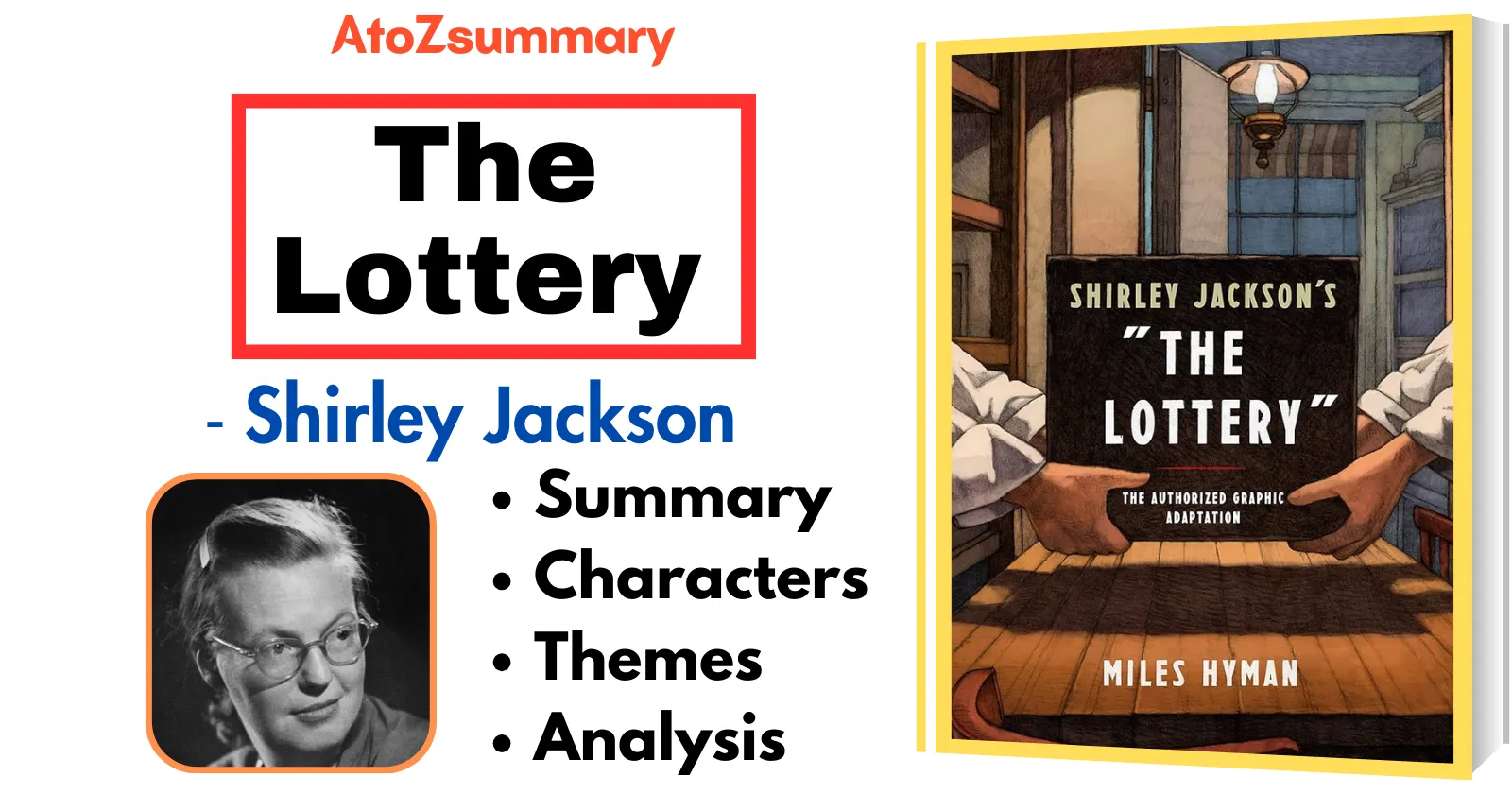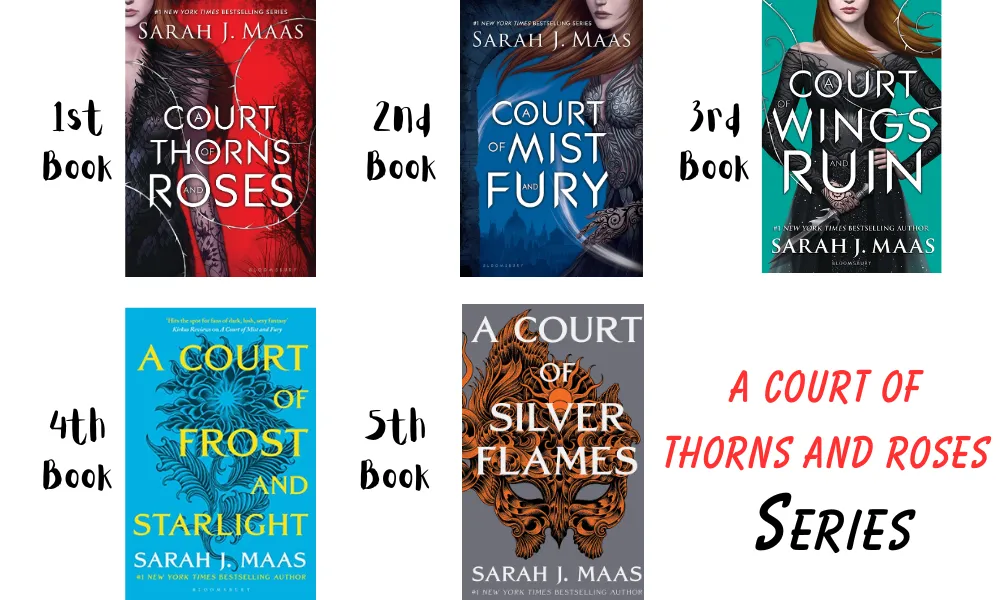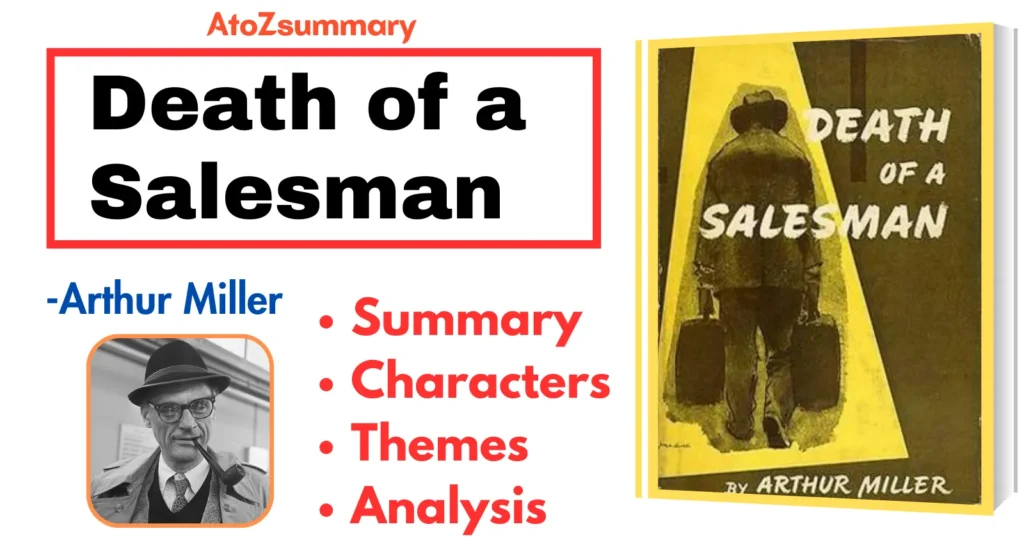About the Story: The Lottery
| Title | The Lottery |
| Author | Shirley Jackson |
| Genre | Short story, Dark fiction, Psychological horror |
| Publication Year | 1948 |
| Setting | Small town, seemingly normal, rural environment |
| Characters | Tessie Hutchinson (main character), Mr. Summers (conducts the lottery), various townspeople |
| Plot | The story revolves around a traditional annual lottery in a small town, culminating in a shocking and brutal ritual. |
| Tone | Initially calm and normal, turns dark and foreboding as the lottery unfolds. |
| Themes | Blind obedience to tradition, the brutality of mob mentality, the randomness of violence in society. |
| Symbolism | The black box, the lottery itself, and the stones used in the ritual carry symbolic significance. |
| Message | Explores the dangers of blindly following tradition and the potential for cruelty within seemingly ordinary communities. |
Analysis: The Lottery
“The Lottery” by Shirley Jackson is a chilling exploration of societal conformity and the potential for cruelty within communities. It reveals how people can blindly follow traditions, even when they involve harm to others. The story serves as a warning about the dangers of unquestioningly accepting established norms and the potential for violence that lies beneath seemingly ordinary surfaces.
Characters: The Lottery
The characters of “The Lottery” by Shirley Jackson are:
- Tessie Hutchinson: A woman who becomes the unfortunate target of the lottery.
- Mr. Summers: The person who conducts the lottery in the town.
- Mr. Hutchinson: Tessie’s husband, who participates in the lottery without objection.
- The townspeople: Representing a community that blindly follows a disturbing tradition without questioning its morality.
Themes: The Lottery
The themes of “The Lottery” by Shirley Jackson are:
- The dangers of blind conformity: The villagers of the story blindly follow a tradition, even when it has lost its meaning and become harmful. This shows how dangerous it can be to simply follow the crowd without questioning our actions.
- The dark side of human nature: The story reveals the capacity for cruelty and violence that exists within all of us. The villagers are willing to stone one of their own to death without hesitation, showing how easily our humanity can be lost.
- The destructive nature of tradition: The lottery tradition is shown to be meaningless and harmful, yet the villagers continue to follow it blindly. This shows how dangerous it can be to cling to outdated traditions without questioning their value.
Watch Full Video Summary of “The Lottery”
The Lottery Summary
Set in a small town on a sunny summer day, the narrative begins with the townspeople gathering in the town square for an annual event known as “the lottery.” The atmosphere is initially cheerful, with children playing and adults engaging in casual conversations, but an underlying tension becomes palpable as the story progresses.
The story opens with the townspeople assembling for the lottery, and the narrator provides a vivid description of the setting. The sun is shining, and flowers are in full bloom, creating an ironic contrast to the ominous events that will unfold. The lottery is an age-old tradition in the town, and the townspeople participate with a sense of obligation rather than enthusiasm. This tradition has been passed down from generation to generation, and its origins are obscure.
As the townspeople gather, the narrator introduces Mr. Summers, the organizer of the lottery. He arrives carrying a black box, which symbolizes the tradition and the ominous nature of the lottery. The box has been in use for many years, and its worn appearance adds an element of mystery and antiquity to the ritual. Mr. Summers is assisted by Mr. Graves, whose name foreshadows the grim nature of the lottery.
The townspeople, including men, women, and children, come forward to draw slips of paper from the black box. The atmosphere remains tense, and nervous laughter is exchanged among the participants. The first indication that the lottery is not a typical event is revealed when Mr. Adams mentions that in some towns, they are considering giving up the lottery. However, this suggestion is met with resistance, and the tradition persists.
As the drawing continues, the tension intensifies, and the true nature of the lottery becomes apparent. The Hutchinson family is singled out when Mrs. Hutchinson draws a slip of paper with a black dot on it. The atmosphere shifts from uneasy tension to a chilling realization as the townspeople close in on the Hutchinsons. Mrs. Hutchinson protests the unfairness of the process, but the townspeople are indifferent to her pleas.
The climax of the story occurs when the townspeople turn on Mrs. Hutchinson, and the shocking truth is revealed. The lottery is not a fortunate event; instead, it is a ritualistic stoning that results in the death of one member of the community. The townspeople, including family and friends, turn against the chosen individual, and a violent mob mentality takes over.
The story concludes with the townspeople callously carrying out the stoning of Mrs. Hutchinson. The once-close-knit community becomes a symbol of the dark side of human nature, where conformity and tradition lead to the senseless sacrifice of an innocent person. The final image of Mrs. Hutchinson being stoned to death leaves a haunting impact on the reader, forcing them to reflect on the dangers of blindly following tradition and the capacity for cruelty within human societies.
FAQs
What is the lottery story actually about?
Hidden beneath a veneer of normalcy, The Lottery exposes the dark depths of human nature and the dangers of blind tradition.
What is the main idea of the lottery?
The Lottery by Shirley Jackson highlights the dangers of blindly following traditions without understanding their meaning, leading to the shocking sacrifice of an innocent member of the community.
Why was tessie late to the lottery?
Tessie was late to the lottery because she forgot what day it was.
Who are Don and Eva in the lottery?
Don and Eva are daughter and son-in-law of the Hutchinson family.
What does Old Man Warner symbolize in the lottery?
Old Man Warner symbolizes the unyielding grip of tradition and the dangers of blindly following customs.
What are some foreshadowing in the lottery?
The children gathering stones, the villagers’ urgency to finish the lottery, and Tessie’s reluctance to accept her husband’s “win” all foreshadow the dark ending.
What does Mr Summers symbolize in the lottery?
Mr. Summers symbolizes the blind adherence to tradition and the dark underbelly of seemingly peaceful communities.
What happened to the winner of the lottery in the story?
The winner of the lottery in “The Lottery” by Shirley Jackson is stoned to death by the townspeople.
What happens at the end of the lottery?
The winner, Tessie, is stoned to death by her fellow townspeople.











